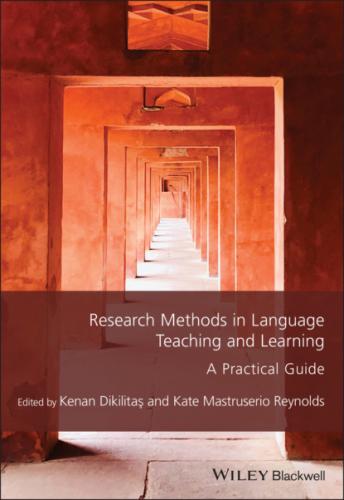17 Dörnyei, Z. (2002). Questionnaires in second language research. Lawrence Erlbaum Associates.
18 Ebbutt, D. (1985). Educational action research: Some general concerns and specific quibbles. In R. Burgess (Ed.), Issues in educational research (pp. 152–174). Falmer Press.
19 Elliott, J. (1991). Action research for educational change. Open University Press.
20 Flick, U. (2006). An introduction to qualitative research. Sage.
21 Frost, P. (2002). Principles of the action research cycle. In R. Ritchie, A. Pollard, P. Frost, & T. Eaude (Eds.), Action research: A guide for teachers burning issues in primary education (pp. 24–32). National Primary Trust.
22 Geertz, C. (1973). The interpretation of cultures: Selected essays. Basic Books.
23 Glaser, B. G. (1978). Theoretical sensitivity. The Sociology Press.
24 Glaser, B. G. (2007). Naturalist inquiry and grounded theory. Historical Social Research/Historische Sozialforschung. Supplement, 19, 114–132. https://www.jstor.org/stable/40981073
25 Glaser, B. G., & Holton, J. (2004). Remodeling grounded theory. In Forum Qualitative Sozialforschung/Forum: Qualitative Social Research, 5(2). https://doi.org/10.17169/fqs-5.2.607
26 Gorsuch, G. J. (2000). EFL educational policies and educational cultures: Influences on teachers’ approval of communicative activities. TESOL Quarterly, 34(4), 675–710. https://doi.org/10.2307/3587781
27 Grainger, T. (2000). The current status of oracy: A cause of (dis)satisfaction? In J. Davison & J. Moss (Eds.), Issues in English teaching (pp. 57–72). Routledge.
28 Grix, J. (2004). The foundations of research. Palgrave Macmillan.
29 Gürsoy, E., Korkmaz, S. C., & Damar, E. A. (2013). Foreign language teaching within 4+4+4 education system in Turkey: Language teachers’ voice. Eurasion Journal of Educational Research, 53, 59–74. http://ejer.com.tr/public/assets/catalogs/0527491001578658390.pdf
30 Hall, H. M., & Austin, T. (2004). Content-based second language teaching and learning: An interactive approach. Pearson Education.
31 Hammersley, M. (2004). Action research: A contradiction in terms? Oxford Review of Education, 30(2), 165–181. https://doi.org/10.1080/0305498042000215502
32 Heigham, J., & Croker, R. (Eds.). (2009). Qualitative research in applied linguistics: A practical introduction. Palgrave Macmillan:
33 Holliday, A. (2002). Doing and writing qualitative research. Sage.
34 Holliday, A. (2007). Doing and writing qualitative research. Sage.
35 Holloway, I., & Wheeler, S. (2002). Qualitative research in nursing. Wiley-Blackwell.
36 Hopkins, D. (2008). A teacher’s guide to classroom research. Open University Press.
37 Johnson, K. E. (1995). Understanding communication in second language classrooms. Cambridge University Press.
38 Kemmis, S. (2009). Action research as a practice-based practice. Educational Action Research, 17(3), 463–474. https://doi.org/10.1080/09650790903093284
39 Kemmis, S., & McTaggart, R. (1988). The action research planner. Deakin University Press.
40 Kırkgöz, Y. (2008). Curriculum innovation in Turkish primary education. Asia-Pacific Journal of Teacher Education, 36(4), 309–322. https://doi.org/10.1080/13598660802376204
41 Kouraogo, P. (1993). Language learning strategies in input-poor environments. System, 21(2), 165–173. https://doi.org/10.1016/0346-251X(93)90039-J
42 Kvale, S. (1996). Interviews: An introduction to qualitative research interviewing. Sage.
43 Lei, L., & Qin, X. (2009). An empirical study of success and failure attributions of EFL learners at the tertiary level in China. The Asian EFL Journal Quarterly, 11(3), 29–51.
44 Lincoln, Y. S., & Guba, E. G. (1985). Naturalistic inquiry. Sage Publications.
45 Littlewood, W. (1992). Teaching oral communication: A methodological framework. Blackwell Publishers.
46 McKay, S. L. (2006). Researching second language classrooms. Lawrence Erlbaum Associates.
47 McNiff, J., Lomax, P., & Whitehead, J. (1996). You and your action research project. Routledge.
48 Miles, M. B., & Huberman, A. M. (1994). Qualitative data analysis: A sourcebook (2nd ed.). Sage
49 Morse, J. M. (2007). Sampling in grounded theory. In A. Bryant & K. Charmaz (Eds.), The Sage handbook of grounded theory (pp. 229–244). Sage.
50 Nunan, D. (1991). Language teaching methodology: A textbook for teachers. Prentice Hall.
51 Nunan, D. (1992). Collaborative language learning and teaching. Cambridge University Press.
52 Pan, L., & Block, D. (2011). English as a “global language” in China: An investigation into learners’ and teachers’ language beliefs. System, 39(3), 391–402. https://doi.org/10.1016/j.system.2011.07.011
53 Patton, M. Q. (1980). Qualitative evaluation and research methods (2nd ed.). Sage Publications.
54 Perry, F. L. (2005). Research in applied linguistics: Becoming a discerning consumer. Routledge.
55 Richards, K. (2003). Qualitative inquiry in TESOL. Palgrave Macmillan.
56 Rossman, G. B., & Rallis, S. F. (2003). An introduction to qualitative research: Learning in the field. Sage Publications.
57 Strauss, A., & Corbin, J. (1998). Basics of qualitative research techniques. Sage Publications.
58 Ur, P. (1996). Course in language teaching: Practice and theory. Cambridge University Press.
59 Uysal, H. H. (2012). Evaluation of an in-service training program for primary-school language teachers in Turkey. Australian Journal of Teacher Education, 37(7), 14–29. http://ro.ecu.edu.au/ajte/vol37/iss7/2
60 Uztosun, M. S. (2013). The role of students’ negotiation in improving the speaking ability of Turkish university EFL students: An action research study. Unpublished EdD Thesis, University of Exeter.
61 Uztosun, M. S. (2017a). Profiles of Turkish pre-service teachers of English in terms of language learning background. Journal of Further and Higher Education, 41(4), 492–503. https://doi.org/10.1080/0309877X.2015.1135883
62 Uztosun, M. S. (2017b). The development of a scale for measuring the self-regulated motivation for improving speaking English as a foreign language. The Language Learning Journal, 48(2), 213–225 https://doi.org/10.1080/09571736.2017.1335766
63 Uztosun, M. S. (2018). In-service teachers’ voices on the quality of English language teaching in Turkey. Erzincan University Journal of Education Faculty, 20(1), 140–155. https://doi.org/10.17556/erziefd.334460
64 Uztosun,
